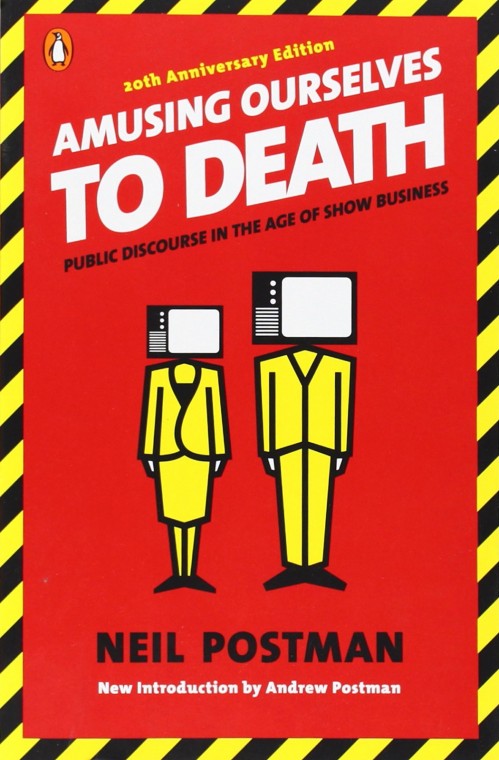Amusing Ourselves To Death
Americans no longer talk to each other, they entertain each other. They do not exchange ideas, they exchange images. They do not argue with propositions; they argue with good looks, celebrities and commercials.

Recently I completed Amusing Ourselves to Death by Neil Postman, a rather persuasive book about the effects of television on politics, religion, and journalism. I had previously quoted it in my review of Brave New World to illustrate the contrast between Huxley and Orwell’s 1984. I recently revisited it to dissect Postman’s observations on public discourse and contemporary affairs. Despite its initial publication in 1985, it’s astonishing how relevant much of its content remains and how applicable it is to the modern era of short-form video feeds and the hidden implications of social media.
The book is really a very long and compelling thesis on how American society has fallen into a state of ignorance. Despite its origins with capable intellectuals, Postman argues that it took just two centuries and a communication revolution to regress entirely.
Postman meticulously explores the eighteenth and nineteenth centuries, focusing on the dominance of the printed word and the subsequent control it exerted over discourse, attention, and intellect. He illustrates that during this time, the written word represented truth, with the emphasis on the content’s knowledge rather than the prominence of individuals.
In 1854, Stephen A. Douglas presented a three hour speech against Abraham Lincoln’s poltiical philosophies, giving Lincoln three hours to respond accordingly. The audience stuck around and engaged for the full debate, considering it a significant social event of the era.
Now, fast forward to modern times and observe the debates on a network like Fox News. These debates often extend over a couple of hours, featuring up to eight candidates who engage in rapid-fire verbal attacks against one another instead of addressing the disjointed questions posed to them, each candidate given only thirty seconds to respond. Frequently, candidates are abruptly cut off to make way for commercial breaks.
Postman contends that as time progressed, the emergence of the telegram and the proliferation of visual photography began to overshadow the precedence of the printed word, ushering in an era characterized by information overload. Although this period was marked by the spread of valuable bits of information, he argues that the sheer volume of data fundamentally altered society’s ability to process and absorb that information effectively, thereby impacting our capacity for learning and meaningful reaction.
Postman’s central thesis posits that the primary conduit for information within society, and he contends that television (which is really just the telegram and photography combined) is primarily designed for entertainment. While this is not problematic by itself, the bulk of his thesis goes on to showcase how the importance of ratings has significantly transformed the interpretation of religion, journalism, and even education.
Despite being written almost 50 years ago, the alignment between Postman’s insights and the contemporary prevalence of vertical short video feeds and social media platforms renders his argument even more relevant.
Though his arguments are undeniably intriguing, my main critique is that they don’t offer a robust counter-vision. While I’m glad that Postman didn’t just take the “TV is bad” stance, there isn’t much that the reader can do to fight it. There are chapters that drag on for a while with references that don’t mean much in today’s context.
This book opened my eyes to how my mind had become entangled in the web of social media and continuous content consumption. It made me realize how my attention span and eagerness to learn had been reshaped by the constant onslaught of information. Given the line of work that I do, there is no escape to the various forms of media that emerges. When Facebook essentially forced everyone to switch their content into short videos, the entire tech industry and its various offshoots had no choice but to comply. I, too, will need to adapt, but I hope to do so with a heightened awareness of its impact.
What steps do you plan to take to reduce the conflict in the Middle East? Or the rates of inflation, crime and unemployment? What are your plans for preserving the environment or reducing the risk of nuclear war? What do you plan to do about NATO, OPEC, the CIA, affirmative action, and the monstrous treatment of the Baha’is in Iran? I shall take the liberty of answering for you: You plan to do nothing about them.
Overall Rating: 7/10
